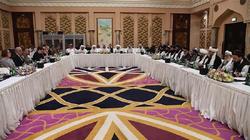 The Taliban’s deputy leader has said that despite mutual mistrust, the militant group is “fully committed” to upholding a peace deal it is about to sign with the United States to end a nearly two-decade war in Afghanistan.
The Taliban’s deputy leader has said that despite mutual mistrust, the militant group is “fully committed” to upholding a peace deal it is about to sign with the United States to end a nearly two-decade war in Afghanistan. RNA - In an opinion piece published in the New York Times on Tuesday, Sirajuddin Haqqani wrote that the group would soon sign a agreement with the United States to reduce attacks for seven days.
"That we today stand at the threshold of a peace agreement with the United States is no small milestone," wrote Sirajuddin.
"Achieving the potential of the agreement, ensuring its success and earning lasting peace will depend on an equally scrupulous observance by the United States of each of its commitments."
Haqqani wrote, “The long war has exacted a terrible cost from everyone. We thought it unwise to dismiss any potential opportunity for peace no matter how meager the prospects of its success."
He said the US-led Western alliance forced war upon Afghans and they had no choice but to defend themselves.
“We did not choose our war with the foreign coalition led by the United States. We were forced to defend ourselves," he said.
The Taliban commander highlighted the demands of his group, saying “withdrawal of foreign forces has been their first and foremost demand".
“The withdrawal of foreign forces has been our first and foremost demand. That we today stand at the threshold of a peace agreement with the United States is no small milestone."
This is the first significant public statement by a Taliban leader on the accord for a week-long reduction in clashes.
The Haqqani network operates on both the Pakistani and Afghan side of the border. It has been behind some deadly attacks against civilians, security forces and NATO forces in the Afghan capital over the past decade.
Sediq Sediqqi, a spokesman for Afghan presidential palace, reacted strongly to the article.
"It is sad that the (New York Times) has given their platform to an individual who is on a designated terrorist list. He and his network are behind ruthless attacks against Afghans and foreigners," the spokesman said.
Washington has for weeks been calling on the militants to reduce attacks on US forces, posing it as a condition for resuming formal negotiations on an agreement that would see US troops begin to leave the country after a near two-decade war.
Pentagon chief Mark Esper recently described the recent talks between American officials and representatives of the Afghan Taliban as "very promising”. Esper said last week that the US and the Taliban had agreed on a seven-day reduction in attacks that could result in the exit of US troops from Afghanistan.
In recent weeks, US special envoy Zalmay Khalilzad, who is leading negotiations with the Taliban, has launched a new round of shuttle diplomacy by travelling to Pakistan and Afghanistan to brief officials on the status of the talks.
Islamabad has helped facilitate the talks between the Afghan Taliban and Washington in Qatar.
Pakistan was one of only three countries to recognize a Taliban regime that the US attacked Afghanistan to topple in 2001.
The Taliban and the US had been negotiating the deal for a year and were on the brink of an announcement in September 2019, when President Donald Trump abruptly declared the process “dead.”
Talks restarted in Qatar later in December last year, but were suspended again following an attack near the Bagram military base in Afghanistan, which is run by the US.
Violent assaults in Afghanistan have meanwhile been raging, with the number of clashes jumping to record levels in the last quarter of last year.
Afghanistan's acting interior minister said on Tuesday that an agreement to cut violence would be enforced within five days.
There are now about 13,000 US troops as well as thousands of other NATO troops in Afghanistan.
Officials in Afghanistan and the United States have said a certain number of troops would remain in the country to ensure stability.
847/940